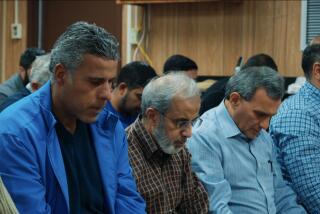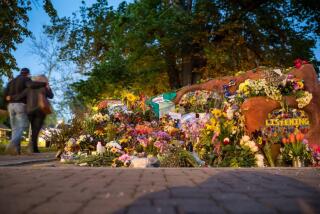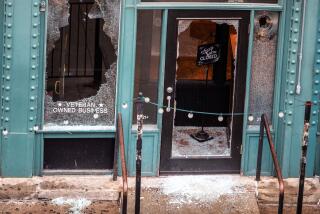Lest Hate Victim Be Forgotten
- Share via
Weeks afterward, people were still talking about the gunman’s rampage, about the children he shot, about the hate he spewed. But the killing of Joseph Ileto remained at the fringes of discussion. Sometimes he was not mentioned at all.
Ileto was not a child. He was not Jewish. And he was not at the North Valley Jewish Community Center on Aug. 10, 1999. He was Filipino American--and Buford O. Furrow Jr., a white supremacist, confessed that he had killed Ileto for the color of his skin.
On Wednesday, Furrow pleaded guilty in federal court to murdering Ileto and wounding five people. He was sentenced to life in prison. Shortly afterward, Ileto’s brother spoke at a news conference, and in a few wrenching moments he offered a view of the transformation his family has undergone in the 17 months since the slaying.
“We deeply miss our brother,” Ismael Ileto said, his eyes glassy with tears. “But we’re extremely relieved that there’s closure in this case. Our family can now turn to concentrate our efforts in . . . hate-crime prevention work.”
Then he called on President Bush to support the federal Specter-Kennedy hate crime prevention bill.
Once an unassuming, apolitical family, the Iletos have become ambassadors against hate. It started because nobody seemed to remember Joseph.
In the days that followed the attack, the family could see Joseph becoming a forgotten victim, even though he was the only person killed that day. Jewish activists, long schooled in dealing publicly with tragedy, quickly activated a well-used network, noting that Furrow had called the community center shooting “a wake-up call to America to kill Jews.”
The Ileto family faced a choice: Mourn quietly and let Joseph’s death be ignored, or speak up.
They swallowed their tears and moved awkwardly into the forefront. In the year and a half since Furrow killed Joseph and shot four children and a grandmother at the community center, Ileto’s family has led a quest to include him and other Asian Americans in the nation’s dialogue on hate.
With Ismael as spokesman, the family has objected whenever Aug. 10 is held up as solely an anti-Semitic incident. They’ve reminded a former Assembly speaker, a popular Los Angeles talk show host, a slew of reporters and former President Clinton.
Family members have led rallies, appeared before city councils, spoken at forums and lobbied for new laws. They’ve also pointed out that, although hate crimes are mostly associated with Jews, homosexuals and African Americans, since 1998 nine Asian Americans have been killed in such incidents. Ileto was the fifth.
“When it comes to Asians, there’s always an oversight,” said Ismael, a 38-year old United Parcel Service driver. “. . . I’m sure every other group of people went through the same thing. . . . But we don’t have to repeat history.”
Right after the shooting, news accounts described Joseph only as a postal worker, although the motive for the slaying was not immediately known. Not even Clinton noted Ileto’s ethnicity when he first spoke of the shooting.
After Ileto’s funeral, the president called the family to express his condolences. Joseph’s mother, Lilian, thanked him and made a request: Please include Joseph’s ethnicity in future remarks.
“In an ideal world [occupation] should be enough to describe someone,” Ismael Ileto said. “It shouldn’t matter what your color was. Our point was, he was killed for being nonwhite.”
‘You Should Be Enraged’
The family’s attitude was galvanized at a gun control news conference held 17 days after the killing.
From their front-row seats, they heard about Furrow’s rampage and the need for tougher gun control laws. But Joseph was not mentioned, family members said, until the news conference was about over. The family stood, stunned. Lilian Ileto said, “I hope there are no other Filipinos here to see.”
Ismael Ileto responded: “Mom, you should not be embarrassed. You should be enraged.” When he accepted future invitations, he did not hesitate to comment.
Before one rally, he asked former Assembly Speaker Antonio Villaraigosa, “Do you really care about us?” When a town hall meeting on hate and violence went on with no mention of Joseph, Ismael sent a message to the moderator, local talk radio host Larry Elder.
“I don’t want to make a scene here,” Ismael told the messenger. “Could you please mention to him that there was somebody who was killed?”
Nothing in his past prepared Ismael for his new role. He had planned to be a doctor. At Cal State L.A. in the early 1980s he majored in what he calls “biology and goofing off.” He joined the Asian Student Union and the Filipino Club and worked part time.
After Vincent Chin was beaten to death in Detroit by two white men in an infamous 1982 hate killing, Ismael joined a caravan of students and headed to UC Berkeley for a protest. But that was the extent of his activism.
In his junior year, he left his studies to work, lured by the pay of UPS. His only public speaking was to emcee a wedding reception.
But after the slaying, his apprehension faded in the face of one glaring reality: He was his brother’s voice.
For Filipino Americans, Joseph’s death was something “you don’t expect when you come to America pursuing the American dream,” said Prosy Delacruz, a Filipino American organizer. “That hit the immigrants in a very profound way . . . because one of our own has been killed.”
Joseph Santos Ileto was born in the Philippines and raised in Legazpi City by his grandparents, both dentists. In his second year of study at St. Gregory the Great Seminary, he moved to the United States to join his family. He was 14.
“It’s only when he came to the United States [that] we were all together,” his mother said. “He wanted to be with us.”
Joseph, the laid-back older brother who would walk away rather than argue or fight, behaved in ways Ismael did not understand.
“When the trash men came on Monday, he would go out and help them. I would ask, ‘What are you doing?’ ” Ismael said. “I would say, ‘That’s their job.’ ”
Joseph graduated from Schurr High School in Montebello and studied engineering at East Los Angeles College. He worked two jobs--at the post office and at AVX Filters Corp. in Sun Valley, where he tested electrical equipment. Each year he sent gifts to his younger cousins in the Philippines: new sneakers for good grades.
At 39, he lived at home in Monterey Park with his mother, twin sisters--Raquel and Carmina, 30--and a younger brother. Their father died of a heart attack in May 1999. Joseph’s brothers and sisters called him Jojo--or Kuya, a term of respect for an eldest brother.
Ismael lived in Chino Hills with his wife, Deena, and their infant son, Kyle. Joseph and Ismael had one playful rivalry: They sparred over which was better, UPS or the U.S. Postal Service.
Joseph was the family’s Mr. Fix-It. He drove his mother around, changed the oil in his sister’s car and let Raquel practice hair-cutting on him. He was a master chess player. He loved orchids and jokes. He proudly wore post office T-shirts on his days off.
He was delivering mail in Chatsworth on Aug. 10, 1999, when he encountered Furrow, a loner with a history of mental illness and involvement with the white supremacist Aryan Nations. Furrow reportedly asked Ileto to mail a letter and then opened fire, striking the postman nine times.
Earlier, the gunman had gone to the Jewish Community Center in Granada Hills and in less than 30 seconds fired about 70 rounds, wounding Benjamin Kadish, 5, Joshua Stepakoff, 6, James Zidell, 6, Mindy Finkelstein, 16, and 68-year-old Isabelle Shalometh.
At first the Ileto family grieved, not knowing who had killed Joseph or why. Then Furrow confessed after his arrest. He told postal agents he had shot Ileto because Ileto was nonwhite and worked for the government.
Hundreds attended the funeral. Joseph was buried with a chess set, a gift from his mother.
“Jojo, you lived a simple life, you died a violent death,” his great-aunt Adelaida Villanueva said during the service. “Through your death, the world will remember that racial hatred is a terrible thing.”
Filipino Groups Rally Nationwide
The family was not alone. Filipino American organizations staged rallies in Chicago, Seattle, New York, Washington, D.C., Dallas and San Francisco.
The killing “sparked an open debate in our community, and it has forced us to look back at our history in this country over the last 100 years,” said Jon Melegrito, executive director of the National Federation of Filipino American Associations.
The last documented hate killing of a Filipino American had been in 1930 in Watsonville, Calif. Hundreds of rioting white men beat Filipino farm workers, burned farms and left lettuce picker Fermin Tobera dead with a bullet in the heart.
Within the Filipino American community, Melegrito said, many think “of themselves as model minorities who are not vulnerable to discrimination, let alone hate crimes.”
AsianWeek magazine columnist Emil Guillermo referred to Joseph Ileto as “the modern-day symbol, a reminder that hate and ignorance die hard in America.”
Ileto’s transition from unknown victim to contemporary symbol was a consequence of the family’s decision not to “retreat into themselves,” said Lillian Galedo, co-chairwoman of Filipino Civil Rights Advocates in Oakland, which helped organize marches after the killing.
Forty days after Joseph’s slaying, friends and family gathered in a traditional Filipino Catholic Mass to celebrate his spirit’s journey to heaven. By then his family had committed themselves to keeping his name alive.
A cousin turned Joseph’s name into an acronym that was carried on T-shirts and on banners: Join Our Struggle, Educate to Prevent Hate. Instill Love, Equality, Tolerance for Others.
The Asian Pacific American Legal Center of Southern California arranged many of the family’s early appearances. They found themselves in front of microphones after work, on weekends and on their days off. They met Clinton at the White House and former Atty. Gen. Janet Reno. They have spoken at college campuses, scores of marches and the 1999 AFL-CIO national convention.
“And here I am, just a regular citizen,” said Ismael. “It was intimidating.”
In May, Villaraigosa introduced a bill creating a 13-member commission to coordinate human relations work statewide. He invited Ismael Ileto to speak about the bill, which has become law.
Civil rights organizers credit the Ileto family with increasing awareness through their appearances. They travel around the country to speak, “two or three days out of the week, sometimes four,” Deena Ileto said.
Lessons have come from observing the Jewish American community’s quick and firm responses to hate crimes. They staged events and invited the Iletos.
“I think we learned that the Jewish community has developed the ability to respond, given their history, the history of oppression, and we need to be able to organize ourselves,” said Galedo.
“Even now, in our community there’s so many people that don’t know what happened,” Ismael Ileto said. “They have the mentality that it was just bad luck. He was in the wrong place at the wrong time.”
For Ismael, public speaking is more comfortable than before, but not easy. He makes outlines but sometimes loses his place. Occasionally he trips over his words. Sometimes he forgets. Usually he and Deena speak as a team.
They tell students: Once, we were like you, just thinking about the next party. They tell adults: Once our lives were focused on our family, our jobs, our bills. They ask audiences to change, to care about those outside their families, those who are different.
“It’s a lot easier to get involved than to stand behind a podium like this and talk to strangers about how much you miss your brother,” Ismael said at one appearance. “When a community doesn’t speak up when they’re violated, people doing the crimes can think it’s OK.”
The killing has caught Ismael in a paradox: It has put him in front of crowds but left him wary of strangers. “I just have that feeling, a real hesitant, cautious feeling,” he said, “especially when I’m working.”
He is now the oldest of the siblings, left to care for his mother and the others. He thinks about returning to school to study law or public service. All that the family has done and said to keep Joseph’s memory alive still seems not enough.
But there is concrete evidence that Joseph has found a firm place in the dialogue on race. In July, a post office in Chino Hills was named after him. He was mentioned by Vice President Al Gore in his acceptance speech at the Democratic National Convention.
At home, Lilian Ileto is still swallowing tears. “There are moments I just want to cry,” she said. “I can’t, because I don’t want my children to see me or hear me cry. I try to be strong.”
On the first anniversary of Joseph’s killing, a candlelight vigil was held in his honor at a downtown plaza. From front-row seats the family heard people speak about Joseph’s life and his death. They heard pledges to end hate crimes. They heard songs about unity.
That late summer evening had the feel of a promise kept.
On the ground lay a large banner bearing Joseph’s name and photo; it was filled with messages.
“Joseph, we will never forget you,” one woman wrote. “Your life, your death, was not in vain.”
*
More Inside
Killer Spared: Buford O. Furrow Jr.’s mental records caused U.S. attorney to drop execution bid, B1
More to Read
Sign up for Essential California
The most important California stories and recommendations in your inbox every morning.
You may occasionally receive promotional content from the Los Angeles Times.













